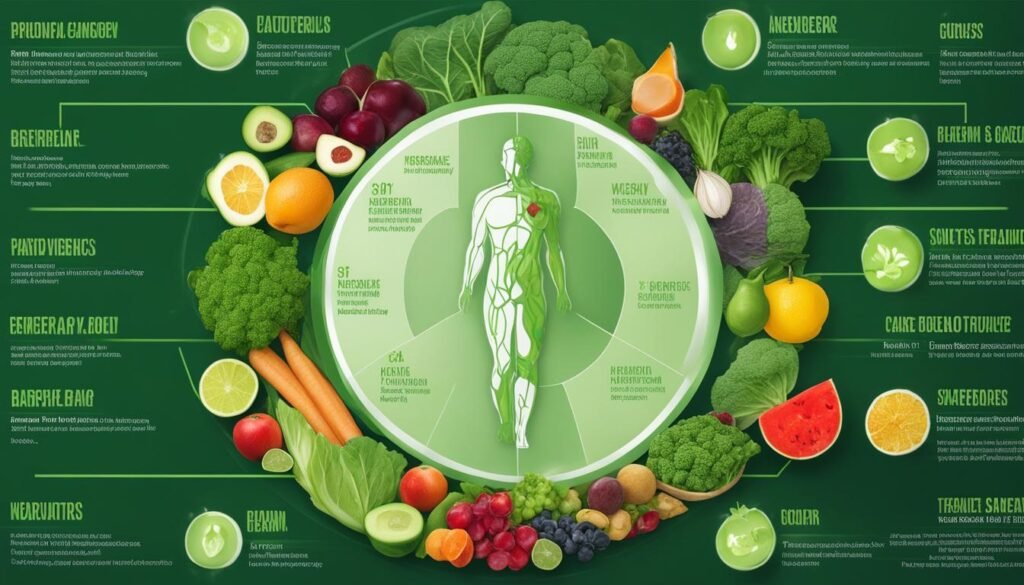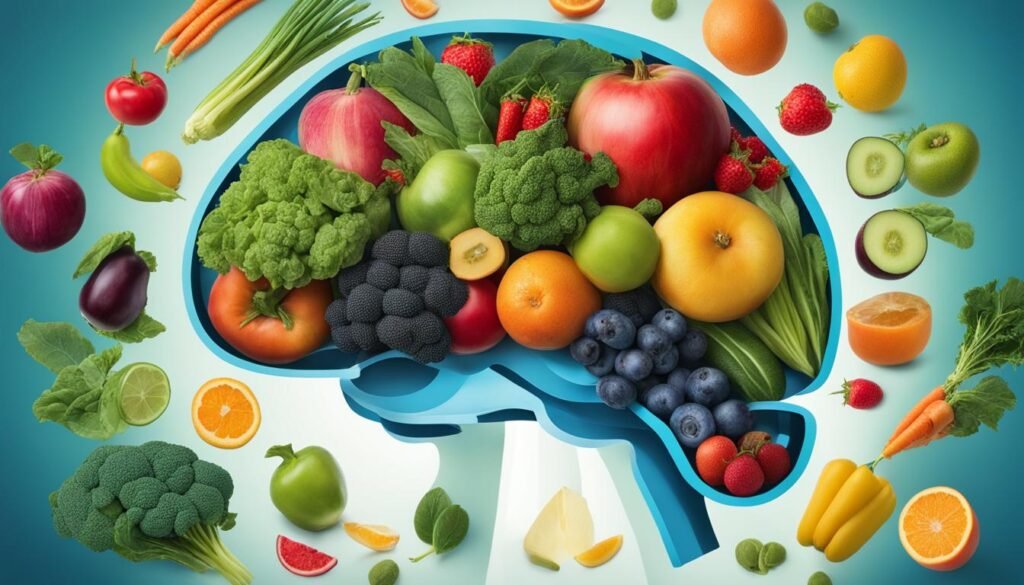Embark on a journey to vitality with our 30-day plant-based diet plan. Discover delicious recipes and health-boosting tips for a transformative lifestyle. This plan is perfect for beginners or anyone looking to follow a 30-day plant-based diet plan. By focusing on plant-based foods and minimizing processed ingredients, you can experience numerous health benefits, including improved heart health, mood, and potential prevention of chronic diseases. Plus, eating plant-based may even save you money at the grocery store.
Key Takeaways:
- A 30-day plant-based diet plan can lead to improved heart health and mood.
- Eating plant-based may help prevent chronic diseases.
- Following a plant-based diet can save you money at the grocery store.
- The plan is suitable for beginners and those looking to try a plant-based lifestyle.
- Minimizing processed ingredients is key to experiencing the health benefits of a plant-based diet.
What is a Plant-Based Diet?
A plant-based diet involves consuming foods primarily derived from plants, such as fruits, vegetables, whole grains, legumes, seeds, and nuts. While some individuals eliminate all animal products (vegan), others may still include certain animal proteins and products (vegetarian) in their diets. The focus is on choosing more of your foods from plant sources and limiting or excluding animal-source products. Plant-based diets offer a range of health benefits and can be customized to individual preferences and needs.
Switching to a plant-based diet can have a positive impact on your health and overall well-being. By incorporating more plant-based foods into your daily meals, you can enjoy a variety of nutrients that are essential for optimal health. Plant-based diets are rich in vitamins, minerals, fiber, and antioxidants, while being lower in saturated fats and cholesterol compared to animal-based diets. This dietary approach has been associated with a reduced risk of chronic diseases, such as heart disease, obesity, and certain types of cancer.
Plant-based diets are not limited to specific meal options or strict rules. They can be adapted to various lifestyles and dietary preferences. Whether you choose to follow a fully plant-based diet or incorporate plant-based meals into your routine, the key is to prioritize whole, unprocessed foods and increase your intake of fruits, vegetables, whole grains, legumes, seeds, and nuts.
Benefits of a Plant-Based Diet:
- Improved heart health
- Weight management and potential weight loss
- Reduced risk of chronic diseases, such as diabetes and certain types of cancer
- Increased intake of essential nutrients
- Support for a healthy gut microbiome
- Environmental sustainability and reduced carbon footprint
“Let food be thy medicine and medicine be thy food.” – Hippocrates
Following a plant-based diet is not only beneficial for your health but also has a positive impact on the environment. By reducing the consumption of animal products, plant-based diets contribute to sustainable food production and conservation of resources.
To further understand the benefits of a plant-based diet, let’s take a closer look at some key advantages:
| Advantage | Description |
|---|---|
| Improved Heart Health | Eating a plant-based diet can lower the risk of heart disease, high blood pressure, and high cholesterol levels. Plant-based foods are typically low in saturated fats and cholesterol, while high in fiber and other heart-healthy nutrients. |
| Weight Management | Plant-based diets are often lower in calories and higher in fiber, promoting satiety and aiding in weight management. They can also help reduce the risk of obesity, a major risk factor for chronic diseases. |
| Reduced Cancer Risk | Consuming a variety of plant-based foods rich in antioxidants and phytochemicals can help reduce the risk of certain types of cancer, including colorectal, breast, and prostate cancer. |
| Nutrient-Dense Diet | Plant-based diets provide a wide range of essential nutrients, including vitamins, minerals, and antioxidants. By incorporating a variety of plant-based foods, you can ensure you’re meeting your nutritional needs. |
By adopting a plant-based diet, you can make a positive impact on your health while enjoying a diverse range of delicious and nutritious foods. Whether you choose to eliminate all animal products or simply incorporate more plant-based meals into your week, the choice to prioritize plants is a step towards a healthier lifestyle.
Principles of a 30-Day Plant-Based Diet Plan
When following a 30-day plant-based diet plan, there are some key principles to keep in mind. By adhering to these guidelines, you can maximize the health benefits and achieve optimal results.
- Avoid Animal-Source Products: One of the central principles of a 30-day plant-based diet plan is to limit or eliminate animal products from your meals. This includes meat, poultry, dairy, and eggs. By relying on plant-based alternatives, you can enjoy a wide variety of flavors and textures while nourishing your body with wholesome ingredients.
- Focus on Whole Foods: Instead of processed options, prioritize whole foods in your 30-day plant-based diet plan. Whole foods refer to foods that are in their natural state and have undergone minimal processing. These include vegetables, fruits, whole grains, legumes, seeds, and nuts. Not only are whole foods packed with essential nutrients, but they also provide dietary fiber, which is beneficial for digestion and overall health.
- Emphasize Plant-Based Foods: Make plant-based foods the foundation of your meals during the 30-day plan. Incorporate a wide variety of colorful vegetables and fruits to ensure you receive a range of vitamins, minerals, and antioxidants. Experiment with different types of whole grains, such as quinoa, brown rice, and oats, to add nutritional diversity and texture to your diet. Legumes, including beans, lentils, and chickpeas, are excellent sources of protein and fiber, making them an essential component of a plant-based diet plan.
- Eliminate Refined Foods: In a plant-based diet plan, it’s important to stay away from refined foods. These include added sugars, processed oils, white flour, and white grains. Refined foods lack the fiber, vitamins, and minerals found in whole foods, and they can contribute to weight gain and chronic diseases. Instead, opt for nutrient-dense alternatives like natural sweeteners, whole wheat flour, and whole grains.
- Choose Quality Foods: To further enhance the benefits of a plant-based diet plan, consider the quality of the foods you consume. Select locally sourced and organically grown options whenever possible. By doing so, you can minimize exposure to pesticides, support sustainable farming practices, and enjoy the freshest produce that is bursting with flavor and nutritional value.
Following these principles will ensure that your 30-day plant-based diet plan is balanced, nourishing, and enjoyable.
Advantages of a 30-Day Plant-Based Whole Food Diet Plan

Following a 30-day plant-based whole food diet plan offers numerous advantages for your health. Eating a plant-based diet has been associated with improved heart health, including lower risks of heart disease, high cholesterol, high blood pressure, and type II diabetes. It may also reduce the risk of certain cancers, slow cognitive decline, control blood sugar levels, and support weight loss. By prioritizing nutrient-dense plant-based foods and avoiding unhealthy processed options, you can optimize your overall well-being.
Plant-based diets have gained popularity due to their positive impact on various aspects of health. The consumption of plant-based foods provides essential nutrients and compounds that support optimal well-being in different ways. Here are the key advantages of following a 30-day plant-based whole food diet plan:
1. Heart Health
A plant-based diet plan has been shown to improve heart health. By incorporating fruits, vegetables, whole grains, legumes, seeds, and nuts into your diet, you can lower the risks of heart disease, high cholesterol levels, high blood pressure, and type II diabetes. Plant-based foods are typically low in saturated fats and cholesterol, while being rich in fiber, antioxidants, and other heart-healthy nutrients.
2. Reduced Cancer Risk
Evidence suggests that a plant-based diet plan may help reduce the risk of certain types of cancer. High intake of fruits, vegetables, and whole grains, which are rich in antioxidants and phytochemicals, has been linked to lower risks of colorectal, lung, and esophageal cancers. Plant-based diets also provide ample fiber, which aids in maintaining a healthy digestive system and reducing cancer risk.
3. Cognitive Health
A plant-based diet plan can support cognitive health and help protect against age-related cognitive decline. The antioxidants, polyphenols, and other beneficial compounds found in fruits, vegetables, whole grains, and nuts have been shown to reduce oxidative stress and inflammation, which are contributing factors to cognitive decline. By including a variety of plant-based foods in your diet, you can support optimal brain function and potentially reduce the risk of cognitive impairments and conditions like Alzheimer’s disease and dementia.
4. Blood Sugar Control
For individuals with type II diabetes or those at risk of developing it, a plant-based diet plan can help improve blood sugar control. Plant-based foods are generally low in glycemic index, meaning they have a minimal impact on blood sugar levels. Additionally, the high fiber content in plant-based foods helps regulate blood sugar levels and improves insulin sensitivity. By following a plant-based diet plan, you can better manage your blood sugar levels and potentially reduce the need for diabetes medications.
5. Weight Loss
One of the notable advantages of a 30-day plant-based whole food diet plan is its potential for weight loss. Plant-based diets are typically lower in calorie density and higher in fiber, which can help you feel fuller for longer and reduce overall calorie intake. By focusing on nutrient-dense plant-based foods and minimizing processed options, you can support healthy weight loss. Incorporating a variety of fruits, vegetables, whole grains, legumes, seeds, and nuts into your diet can help you achieve and maintain a healthy weight.
Overall, a 30-day plant-based whole food diet plan offers a holistic approach to improving your health and well-being. By prioritizing nutrient-dense plant-based foods, you can reap the benefits of improved heart health, reduced cancer risk, enhanced cognitive function, better blood sugar control, and sustainable weight loss.
| Advantages of a 30-Day Plant-Based Whole Food Diet Plan |
|---|
| Improved heart health |
| Reduced cancer risk |
| Cognitive health support |
| Blood sugar control |
| Weight loss |
Foods to Avoid on a Plant-Based Diet

While following a plant-based diet, it’s important to steer clear of certain foods that can hinder your progress and compromise your health goals. By avoiding or limiting these foods, you can maximize the benefits of a plant-based lifestyle.
1. Fast Food
Fast food is often synonymous with unhealthy eating. These convenient options are typically high in saturated fats, added sugars, sodium, and artificial ingredients. Instead of relying on fast food, prioritize home-cooked meals and meal prepping to ensure you have nutritious plant-based options readily available.
2. Added Sugars and Candies
Added sugars can wreak havoc on your health and derail your plant-based journey. Avoid sugary snacks, candies, and beverages that are loaded with empty calories. Instead, satisfy your sweet tooth with natural sweeteners like dates, maple syrup, or fruit.
3. Refined Grains
Refined grains, such as white rice and white bread, undergo processing that removes important nutrients, including fiber. These empty-calorie foods can lead to blood sugar spikes and provide little nutritional value. Opt for whole grains like quinoa, brown rice, and whole wheat bread for added fiber and nutrients.
4. Packaged and Convenience Foods
Many packaged and convenience foods are heavily processed, containing unhealthy additives, preservatives, and high levels of sodium. These foods often lack the nutrients found in whole, unprocessed foods. Instead, choose fresh, whole food options like fruits, vegetables, and legumes.
5. Artificial Sweeteners
Artificial sweeteners may seem like a healthier alternative to sugar, but they come with their own set of concerns. Research suggests that these additives may disrupt gut health and contribute to weight gain. Stick to natural sweeteners or enjoy the natural sweetness of whole fruits.
6. Processed Animal Products
Processed animal products, such as bacon and lunch meats, are often high in saturated fats, sodium, and additives. These can increase the risk of heart disease and other health conditions. Opt for plant-based sources of protein, such as legumes, tofu, tempeh, and seitan, to meet your protein needs.
| Foods to Avoid on a Plant-Based Diet | Reasons to Avoid |
|---|---|
| Fast Food | High in unhealthy fats, sugars, and sodium |
| Added Sugars and Candies | Poor nutritional value and can lead to blood sugar spikes |
| Refined Grains | Lack important nutrients and lead to blood sugar spikes |
| Packaged and Convenience Foods | Highly processed and lack essential nutrients |
| Artificial Sweeteners | Potentially disruptive to gut health and may contribute to weight gain |
| Processed Animal Products | Contain unhealthy fats, sodium, and additives |
By avoiding these foods and making conscious choices to prioritize whole, plant-based foods, you can maximize the benefits of a plant-based diet and optimize your overall health and well-being.
Benefits of a Plant-Based Diet for Heart Health

A plant-based diet is a powerful tool for improving heart health and preventing cardiovascular diseases. By adopting a plant-based lifestyle and incorporating nutrient-rich foods into your meals, you can lower cholesterol levels, reduce blood pressure, and decrease the risk of heart disease.
One of the key components of a plant-based diet is the emphasis on whole grains, fruits, vegetables, legumes, and nuts. These foods are packed with essential vitamins, minerals, and antioxidants that promote cardiovascular health. They are also rich in dietary fiber, which helps lower cholesterol levels and maintain a healthy weight.
“Eating a variety of plant-based foods has been associated with a reduced risk of heart disease and other related conditions.”
– American Heart Association
Plant-based diets are naturally low in saturated fats and cholesterol, which can contribute to high cholesterol levels and clogged arteries. By minimizing or eliminating animal products high in saturated fats, such as red meat and full-fat dairy, you can further reduce your risk of heart disease.
Additionally, plant-based diets are rich in unsaturated fats, often referred to as “healthy fats.” These fats, found in foods like avocados, nuts, and olive oil, have been shown to improve heart health by lowering LDL (bad) cholesterol levels and reducing inflammation in the body.
Let’s not forget about the benefits of plant-based diets on blood pressure. The high potassium content in plant-based foods, such as bananas, leafy greens, and legumes, helps regulate blood pressure levels and maintain a healthy cardiovascular system.
Overall, adopting a plant-based diet can significantly improve heart health by lowering cholesterol levels, reducing blood pressure, and preventing heart disease. By nourishing your body with whole foods from plant sources, you can enjoy a healthier heart and enhance your overall well-being.
| Nutrient | Plant-Based Sources |
|---|---|
| Fiber | Whole grains, fruits, vegetables, legumes, nuts |
| Unsaturated Fats | Avocados, nuts, seeds, olive oil |
| Potassium | Bananas, leafy greens, legumes, potatoes |
| Antioxidants | Berries, dark chocolate, green tea |
By incorporating these plant-based sources into your diet, you can nourish your heart and improve your cardiovascular health.
Reduced Risk of Cancer with a Plant-Based Diet

Consuming a plant-based diet has been associated with a reduced risk of certain cancers, including colorectal, lung, esophageal, bladder, and gastric cancer. Plant-based diets offer a rich source of antioxidants and other beneficial compounds that have shown anti-cancer properties.
Avoiding or limiting processed and red meats, typically found in non-plant-based diets, further reduces the risk of cancer. These meats often contain carcinogenic substances that can increase the likelihood of developing cancer.
Studies have indicated that a plant-based diet can lower the risk of colorectal cancer. The high fiber content in plant-based foods, such as fruits, vegetables, and whole grains, can help maintain a healthy digestive system and reduce the risk of colon cancer.
Furthermore, lung cancer risk can be minimized by prioritizing plant-based foods. By avoiding or reducing consumption of processed meats and other unhealthy animal products, individuals can lower their exposure to potential carcinogens and decrease the chances of developing lung cancer.
Plant-based diets have also been linked to a reduced risk of esophageal cancer. The consumption of a variety of fruits, vegetables, and whole grains can help protect the esophageal lining and reduce inflammation, which may lower the risk of developing this type of cancer.
Reduced Risk of Cancer with a Plant-Based Diet: Summary
Adopting a plant-based diet can play a significant role in reducing the risk of various types of cancer, including colorectal, lung, and esophageal cancer. By incorporating antioxidant-rich plant-based foods into your diet and avoiding processed and red meats, you can improve your chances of maintaining good health in the long run.
Cognitive Health Benefits of a Plant-Based Diet

Plant-based diets have shown promising benefits for cognitive health. These diets are high in antioxidants and polyphenols, which can help protect against oxidative stress and inflammation, known contributors to cognitive decline. By adopting a plant-based diet, you can provide your brain with the necessary nutrients to support optimal cognitive function.
The antioxidants and polyphenols found in plant-based foods help combat oxidative stress, which occurs when there is an imbalance between free radicals and antioxidants in the body. Oxidative stress can lead to damage to brain cells and contribute to cognitive decline, Alzheimer’s disease, and dementia.
Research has found that plant-based diets can slow the progression of Alzheimer’s disease and even reverse cognitive deficits. In a study conducted by Rush University Medical Center in Chicago, participants who followed a plant-based diet had a slower rate of cognitive decline compared to those who ate a standard Western diet.
A plant-based diet can also reduce the risk of cognitive impairment and dementia. A review of multiple studies published in the journal Frontiers in Aging Neuroscience found that adhering to a plant-based diet was associated with a reduced risk of developing cognitive impairment and Alzheimer’s disease.
“The findings suggest that adopting a plant-based diet may have a protective effect against cognitive decline and neurodegenerative diseases.”
To maximize the cognitive health benefits of a plant-based diet, it is important to include a variety of fruits, vegetables, whole grains, and nuts in your daily meals. These plant-based foods are rich in essential vitamins, minerals, and antioxidants that support brain health.
Whether you’re looking to improve your memory, enhance cognitive function, or reduce the risk of cognitive decline, a plant-based diet can be a valuable addition to your lifestyle.
Key Takeaways:
- A plant-based diet high in antioxidants and polyphenols can protect against oxidative stress and inflammation, known contributors to cognitive decline.
- Plant-based diets have been shown to slow the progression of Alzheimer’s disease, reverse cognitive deficits, and reduce the risk of cognitive impairment and dementia.
- Including a variety of fruits, vegetables, whole grains, and nuts in your plant-based meals can support optimal brain function.
Blood Sugar Control and Prevention of Diabetes with a Plant-Based Diet

Following a plant-based diet can be a powerful tool in controlling blood sugar levels, making it highly beneficial for individuals with type II diabetes. Numerous studies have highlighted the positive impact of plant-based diets on insulin sensitivity and glycemic control, resulting in reduced reliance on diabetes medications.
A plant-based diet emphasizes the consumption of whole foods, such as fruits, vegetables, whole grains, legumes, seeds, and nuts. By prioritizing these nutrient-dense options and minimizing processed sugars and refined carbohydrates, individuals can effectively manage their blood sugar levels.
Research has also shown that adopting a plant-based diet can significantly lower the risk of developing type II diabetes. In fact, individuals who follow a healthy plant-based diet have been found to have up to a 34% lower risk compared to those who rely on an unhealthy, non-plant-based diet.
By choosing plant-based foods that are high in fiber, vitamins, and minerals, individuals can promote better blood sugar control and reduce their risk of diabetes-related complications. Focusing on whole foods also helps maintain a healthy weight, which is another crucial factor in preventing and managing diabetes.
Embracing a plant-based lifestyle empowers individuals to take control of their health and actively prevent the onset of type II diabetes. With an abundance of delicious and nutritious plant-based options available, it is easier than ever to enjoy a varied and satisfying diet while reaping the many benefits for blood sugar control and overall well-being.
Weight Loss Benefits of a Plant-Based Diet
A plant-based diet offers an effective approach for weight loss and weight management. By prioritizing whole, nutrient-dense foods and reducing or eliminating high-calorie processed options, individuals following a plant-based diet often experience positive changes in body mass index (BMI) and improved cholesterol levels.
Plant-based diets are typically lower in calories and saturated fats while being higher in fiber, which can contribute to weight loss. The abundance of fiber-rich foods like vegetables, fruits, whole grains, legumes, and nuts helps in maintaining satiety and preventing overeating. These foods provide essential nutrients while being lower in calories, making them an excellent choice for healthy weight management.
In addition to their impact on body weight, plant-based diets have the potential to improve cholesterol levels. High-fiber foods, such as whole grains and legumes, have been shown to help lower cholesterol levels. Furthermore, plant-based diets are naturally low in saturated fats, which are known to raise cholesterol levels. By reducing saturated fats and opting for healthier fat sources like avocados and nuts, individuals can support their cardiovascular health.
| Weight Loss Benefits of a Plant-Based Diet: | How it Helps: |
|---|---|
| Reduced BMI | A plant-based diet helps promote weight loss, resulting in a lower BMI. |
| Improved Cholesterol Levels | By avoiding high-fat animal products and incorporating more plant-based foods, cholesterol levels can be effectively managed. |
Adopting a plant-based diet can lead to lasting weight loss, improved body composition, and reduced risk of chronic diseases. It is essential to focus on a variety of plant-based foods, including a wide range of vegetables, fruits, whole grains, legumes, and nuts, to ensure a well-rounded and balanced diet.
By following a plant-based lifestyle, you can achieve your weight loss goals while enjoying delicious and nutritious meals. Incorporate the goodness of plants into your daily diet and experience the transformative effects it can have on your overall health and well-being.
Common Concerns About Switching to a Plant-Based Diet

Switching to a plant-based diet may raise concerns about potential nutrient deficiencies. However, with proper planning and food choices, these concerns can be addressed.
One common concern is the possibility of amino acid deficiency. Amino acids are the building blocks of protein, and while animal products are typically high in essential amino acids, plant-based sources can provide all the necessary amino acids as well. Foods like quinoa, beans, lentils, and soy are excellent plant-based sources of essential amino acids and proteins.
Iron deficiency is another concern, as iron is commonly associated with animal products. However, plant-based sources can also be rich in iron. Foods like spinach, lentils, and cashews are great plant-based sources of iron.
Vitamin B12 deficiency can be a concern for those following a plant-based diet, as this vitamin is mainly found in animal products. However, vitamin B12 can be obtained through supplements. It’s important to consult a healthcare professional to determine the appropriate dosage and form of supplementation.
Calcium deficiency is often associated with dairy products, but there are plenty of plant-based sources of calcium as well. Foods like tofu, leafy greens, and fortified plant-based milk can provide adequate amounts of calcium.
Omega-3 fatty acid deficiency is commonly addressed through fish consumption. However, plant-based sources of omega-3 fatty acids include flaxseeds, chia seeds, and algae-based supplements.
“Switching to a plant-based diet may initially raise concerns about nutrient deficiencies. However, with proper planning and a varied diet, it is possible to meet all nutrient needs on a plant-based diet.” – Dr. Jane Foster
By incorporating a variety of plant-based foods and considering potential nutrient sources, individuals can ensure they are meeting their nutritional needs while following a plant-based diet.
Conclusion
Embarking on a 30-day plant-based diet plan can bring about remarkable changes in your health and overall well-being. By prioritizing whole foods, increasing your intake of fruits and vegetables, and minimizing processed options, you can reap the benefits of a plant-based lifestyle.
One of the primary advantages of following a plant-based diet is improved heart health. By choosing plant-based foods over animal products high in saturated fats, you can lower your risk of heart disease, high cholesterol, and high blood pressure.
Additionally, adopting a plant-based lifestyle can reduce the risk of cancer, support cognitive function, help control blood sugar levels, and facilitate weight loss. However, it’s crucial to address any potential nutrient deficiencies that may arise. This can be achieved through proper food choices or by incorporating supplements into your diet.
In conclusion, the 30-day plant-based diet plan offers a transformative approach to healthy living. By embracing whole foods, increasing your fruit and vegetable consumption, and minimizing processed options, you can experience the numerous benefits that a plant-based lifestyle has to offer.
Also Refer : Stay Fit with High Fiber And Protein Diet
FAQs
Q: What is a 30-day plant-based diet plan?
A: A 30 day plant-based diet plan focuses on consuming food derived from plants while excluding or minimizing any animal products cilantro, tortilla, sesame, hummus, soy milk . It is a way of eating that emphasizes whole, minimally processed foods.
Q: How can I boost my health with a plant-based diet plan for beginners?
A: Adopting a plant-based diet plan can help boost your health as it can lead to weight loss, improved heart health, lower blood sugar levels, and a decreased risk of certain diseases. It provides essential nutrients, vitamins, and minerals that are beneficial for overall health.
Q: What are some easy plant-based meal ideas for a 30-day plant-based meal plan?
A: Easy plant-based meal ideas include dishes like quinoa salad with roasted vegetables, chickpea curry, lentil soup, vegetable stir-fry, tofu and vegetable kebabs, and avocado toast. These meals are delicious and nutritious, making them perfect for a plant-based meal plan.
Q: How do I create a vegan meal plan for beginners?
A: To create a vegan meal plan for beginners, start by including a variety of fruits, vegetables, whole grains, legumes, nuts, and seeds in your meals. Plan your meals ahead of time, make use of simple recipes, and gradually experiment with different plant-based ingredients to find what works best for you.
Q: What are some key components of a 30-day plant-based meal plan?
A: Key components of a 30-day plant-based meal plan include incorporating a wide variety of fruits and vegetables, whole grains, legumes, nuts, and seeds. It is also important to ensure an adequate intake of plant-based proteins such as tofu, tempeh, quinoa, and legumes.
Q: How can I include more plant-based protein in my diet dinner plan?
A: You can include more plant-based protein in your diet dinner plan by incorporating foods such as lentils, chickpeas, black beans, quinoa, tofu, tempeh, and edamame. These ingredients can be used to create a variety of protein-rich and delicious plant-based meals.
Q: What are some of the main benefits of following a plant-based diet plan for beginners?
A: Some of the main benefits of following a plant-based diet plan for beginners include improved heart health, lower risk of developing chronic diseases, better weight management, increased intake of essential nutrients, and positive impact on the environment.
Q: Are there any specific vegan meals recommended for the first day of a 30-day plant-based meal plan?
A: For the first day of a 30-day plant-based meal plan, consider incorporating meals like almond and berry smoothie, mixed green salad with tofu, vegetable stir-fry with brown rice, and a black bean burger with a side salad. These meals provide a good balance of nutrients and flavors.
Q: How can I make a tasty plant-based dressing using ingredients from a 30-day plant-based meal plan?
A: You can make a tasty plant-based dressing using ingredients like tahini, lemon juice, garlic, olive oil, and a dash of maple syrup. Whisk these ingredients together to create a creamy and flavorful dressing to drizzle over salads or use as a dip for veggies.
Q: How can I ensure that I am getting enough nutrients while following a 30-day plant-based meal plan?
A: To ensure that you are getting enough nutrients while following a 30-day plant-based meal plan, focus on consuming a wide variety of plant-based foods including different types of fruits, vegetables, whole grains, legumes, nuts, and seeds. Additionally, consider incorporating plant-based supplements to cover any potential nutrient gaps.




